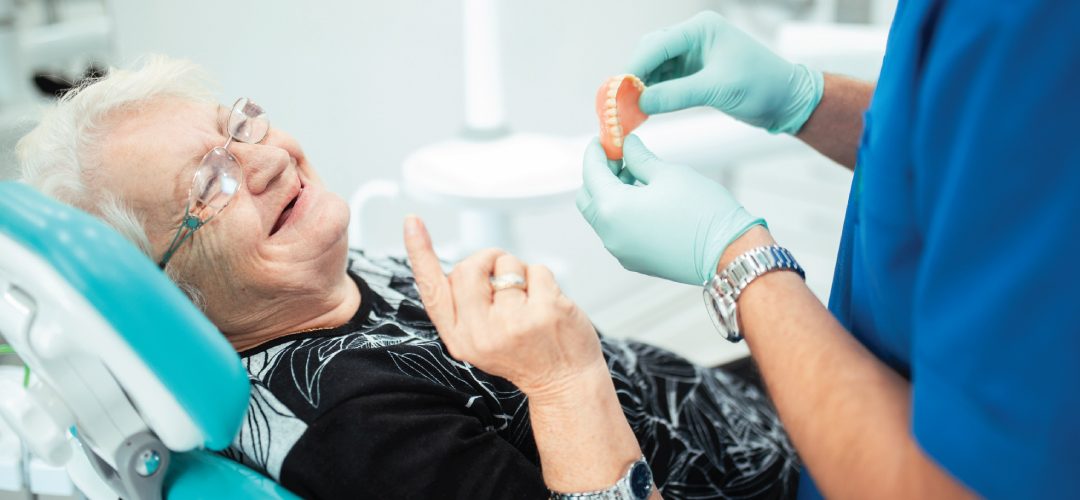Parkinson’s Disease, also known as PD, is a nervous system disorder that affects movement. PD is considered a diverse disorder that develops slowly over time and is different for everyone – no two people experience PD in the same way. Approximately 60,000 Americans are diagnosed with PD each year and over 10 million people worldwide are living with it.
Although PD is a nervous system disorder, it complicates oral health for those diagnosed with this disease. PD’s movement symptoms can interfere with an individual’s ability to maintain oral hygiene because PD affects the health of the mouth, teeth, and jaw.
Parkinson’s Disease Dental Issues
Rigidity, Tremors, Dyskinesia, Fatigue & Anxiety
Rigidity, tremors and dyskinesia symptoms related to PD can make it very challenging to brush your teeth. These symptoms of PD have also been known to cause cracked teeth, tooth wear, tooth grinding and denture issues. Fatigue, anxiety and tremors symptoms related to PD can make traveling to the dentist, sitting still in the dentist’s chair, or opening your mouth wide for the dentist very challenging.
Dental Caries (Tooth Decay)
Dental caries, also known as tooth decay, is damage to a tooth that can happen when decay-causing bacteria in your mouth make acids that attack the tooth’s surface, or enamel. This can lead to a small hole in a tooth, called a cavity.
Periodontal Disease (Periodontitis or Gum Disease)
Periodontal disease, also known as periodontitis or gum disease, begins with bacterial growth in your mouth and may end with tooth loss due to destruction of the tissue that surrounds your teeth, if not treated properly.
Sialorrhea (Drooling or Excessive Salivation)
Sialorrhea, also known as drooling or excessive salivation, is mostly caused by poor oral and facial muscle control. Contributing factors may include hypersecretion of saliva, dental malocclusion, postural problems, and an inability to recognize salivary spill. Sialorrhea causes a range of physical and psychosocial complications, including perioral chapping, dehydration, odor, and social stigmatization, that can be devastating for patients and their families.
Xerostomia (Dry Mouth)
Xerostomia, also known as dry mouth, results from reduced saliva flow. Dry mouth can increase the chance of cavities.
Additional dental health issues that may occur for individuals diagnosed with PD include orofacial pain and burning mouth syndrome, mastication disorders, bruxism, and subjective taste impairment.
Parkinson’s Disease Dental Visit Tips
Going to the dentist when you have PD or taking someone with PD to the dentist can be stressful. The Parkinson’s Foundation has some great tips to make dental visits less stressful for everyone.
- Call first to make the office aware of your PD symptoms. This will help the dentist and the staff provide better treatment.
- Schedule wisely. Plan short dental appointments for the time of day your symptoms are most effectively controlled.
- Give the dentist the details of your overall health. Someone on staff should record vital signs upon arrival.
- Tell the dentist if you are taking MAO-B inhibitors (rasagiline and selegiline), as these may interact with anesthetics.
- Consider replacing old fillings, crowns and bridges, and ill-fitting dentures or mouth guards during the early stages of PD. Dental visits may become more difficult as PD progresses.
Maintaining Good Dental Health with Parkinson’s Disease
It is very important to maintain good dental health when diagnosed with PD. As the disease progresses, it is often up to the caregiver or family member to take the responsibility of oral hygiene because the individual with advanced PD can no longer perform adequate oral self-care. Start now and make it a habit to visit the dentist regularly (every six months). Schedule an appointment today with Roseman Dental.
Treating Parkinson’s Disease at Roseman Medical Group (Nevada Based)
At Roseman Medical Group (RMG), the Nevada based clinical practice of Roseman University’s College of Medicine, has expert neurologist, Eric Farbman M.D., dedicated to treating Parkinson’s Disease and a variety of other neurological disorders. Roseman University is a site for the Parkinson Study Group and currently has studies for patients with many different degrees of Parkinson’s Disease, from newly diagnosed to advanced. The University is waiting to start a study for multiple system atrophy, an atypical Parkinson-plus disorder with no current treatments, as well as an essential tremor study.
RMG also performs more aggressive treatments for Parkinson’s Disease. Dr. Farbman currently manages over 200 deep brain stimulator (DBS) patients for a variety of medical conditions including Parkinson’s disease, essential tremor, and dystonia. For those who are unaware of this treatment, it is essentially a pacemaker for the brain. This treatment can be particularly helpful for involuntary movements and dystonia, especially when maximal oral medical treatment has been provided. There is now a levodopa pump that can be prescribed for Parkinson’s Disease patients as well, and botulinum toxin injection has been a longstanding therapy for dystonia.
The neurologists at RMG provide empathic, patient-centered, evidence-based care. If you have a friend or family member who suffers from Parkinson’s Disease, let RMG’s expert neurologists help! Contact RMG today! If you’d like to learn more about Parkinson’s Disease, click here.



